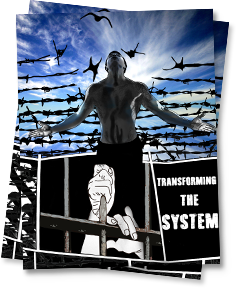Ensure Decent Detention Conditions
Decent detention conditions are basic human rights and crucial to the successful reintegration of formally detained people. Yet, the conditions in some prisons, jails, and immigration detention facilities are so abysmal and abusive that incarcerated people leave the facilities in far worse physical and emotional shape than they entered. It is crucial that detention conditions do not violate the basic human rights of incarcerated individuals. In order to foster successful reintegration, which will in turn reduce recidivism and promote safe communities, detention conditions should be decent, offer rehabilitation, and respect the human rights of individuals who are detained or incarcerated.
Solutions & Actions to Ensure Decent Detention Conditions
It is crucial to our national conscience that prison conditions do not violate the basic human rights of imprisoned people. We pride ourselves on being a nation of values and we can best demonstrate that by how we treat people in the most vulnerable situations – incarcerated people are certainly part of that group. And decent, rehabilitative prisons are not only a basic human right, but also central to the successful reintegration of people emerging from prison.
1) Include the Voices of the Formerly Incarcerated
Congress, state governments, and prison officials should proactively include the voices of incarcerated and formerly incarcerated individuals in assessing policy initiatives that affect people in jails and prisons.
2) Require Gender-Specific Healthcare
Congress and state governments, and prison officials should require the provision of gender-specific and gender-sensitive medical care; provide education and care for individuals with HIV, AIDS, and Hepatitis C, including medical treatment for the curable Hepatitis C; and allow individuals access to appropriate feminine hygiene products and barrier contraceptives.
3) Require LGBTQ-Inclusive Healthcare
Prison officials and the Bureau of Prisons (BOP) should ensure that LGBTQ-inclusive healthcare is provided, make condoms and barriers freely available to incarcerated people, and provide any required therapies to transgender incarcerated people, including hormone therapy.
4) Commission Independent Inspections
Congress and state governments, and detention officials should require independent commissions, which include formerly incarcerated people, to inspect detention conditions and report on compliance with human rights standards.
5) Abolish Solitary Confinement
Congress and state governments should abolish the use of solitary confinement as a disciplinary measure for incarcerated people. It should further be completely banned for young people and individuals with mental, psychiatric, and/or physical health issues.
6) Provide Educational Programs
Congress and state governments should provide prison educational programs that allow individuals to obtain a trade or vocation and use the incentive of “earned time off to encourage participation in addiction treatment, cognitive behavioral therapy, educational classes, faith-based programs, and other self-betterment activities prescribed in accordance with individualized case plans.”
7) Respect Human Rights
Prison officials and the BOP should eliminate prison practices that violate incarcerated people’s human rights, such as the shackling of women during childbirth. United Nations experts and representatives should be provided with unrestricted access to jails and prisons to ensure that they comply with human rights.
8) Eliminate Prison Rape
Congress should provide incentives to state governments and prisons that successfully reduce the occurrence of prison rape consistent with the mandates of the Prison Rape Elimination Act.
9) Re-Fund Pell Grants
Congress should re-fund Pell grants for incarcerated people to allow for education and prepare people to return to their communities.
10) Individualize Rehabilitation
Public defense offices, civil society, and prison and jail officials should play an active role in devising individualized risk assessment tools that provide treatment, programming, and service delivery plans for individuals before they begin a term of incarceration.
It is crucial to our national conscience that prison conditions do not violate the basic human rights of imprisoned people. We pride ourselves on being a nation of values and we can best demonstrate that by how we treat people in the most vulnerable situations – incarcerated people are certainly part of that group. And decent, rehabilitative prisons are not only a basic human right, but also central to the successful reintegration of people emerging from prison.
Flashcards
Below are flashcards for you to use the next time you have a media interview, need to write an opinion piece, or just need some ideas as you think through your messaging strategy.
Ensuring Decent Detention Conditions
value
It is crucial to our national conscience that prison conditions do not violate the basic human rights of imprisoned people. We pride ourselves on being a nation of values and we can best demonstrate that by how we treat people in the most vulnerable situations – incarcerated people are certainly part of that group. And decent, rehabilitative prisons are not only a basic human right, but also central to the successful reintegration of people emerging from prison.
problem
Yet, the conditions in some prisons are so abysmal and abusive that incarcerated people leave the facilities in far worse physical and emotional shape than when they entered. Solitary confinement, which is commonly used in American prisons, is one of the most egregious examples of this. Even short periods can cause mental health issues and severely impact imprisoned persons.
solution
State governments should abolish the use of solitary confinement as a disciplinary measure for incarcerated people. It should further be completely banned for juveniles and individuals with mental, psychiatric, and/or physical health issues.
action
Urge your state policymakers to uphold the rights of everyone in our state by banning this outdated and dangerous practice.
For more information on prison conditions, check out:
- Human Rights Watch, which investigates human rights violations domestically and internationally, with a focus on abuses in the criminal justice system in the United States and a legacy of investigating U.S. prison conditions.
- United Nations Standard Minimum Rules for the Treatment of Prisoners, which provides the basic minimal guidelines for ensuring that the human rights of incarcerated individuals are respected during the course of their detention.




